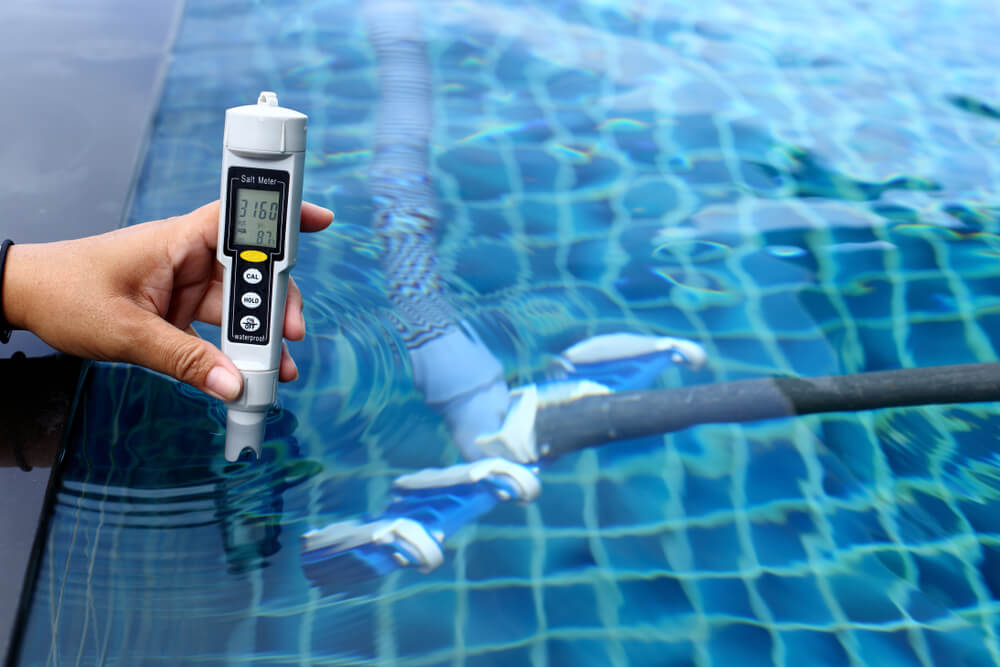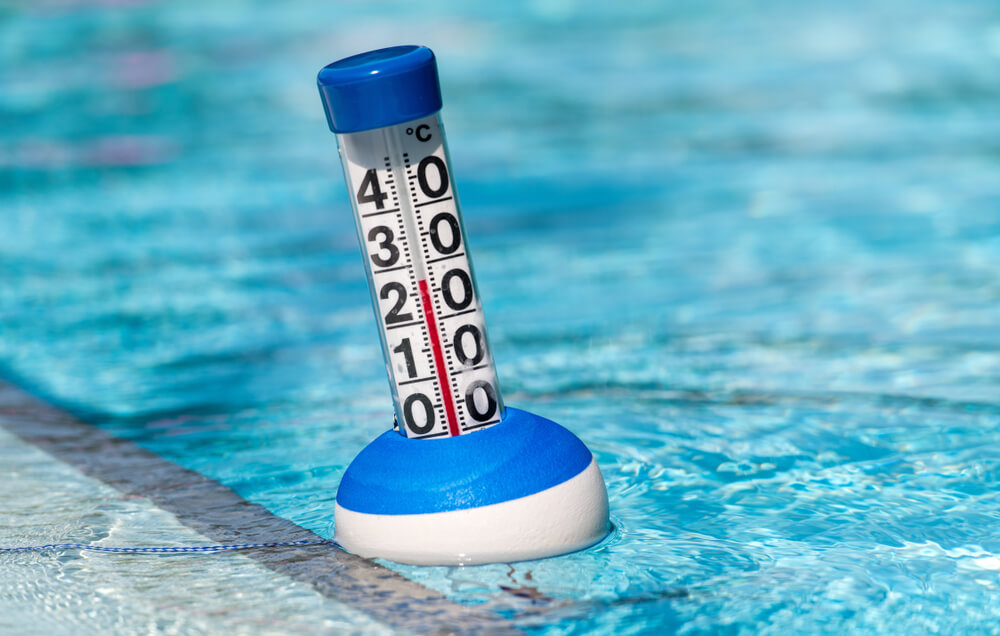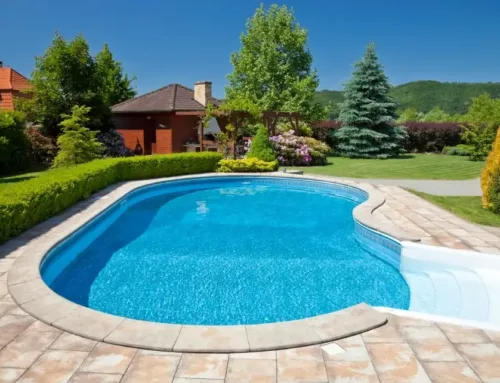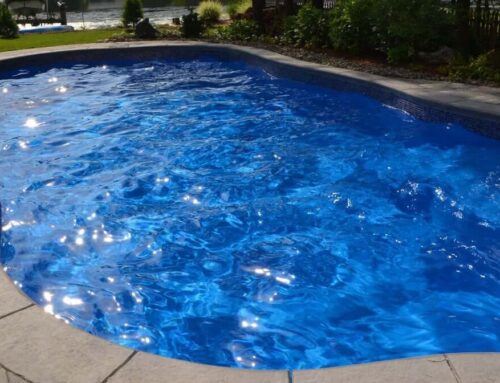Saltwater pools have been available since at least the early 90s and have become quite popular quite fast. You’ve probably heard about them or even used one at a hotel or resort. And you’ll be happy to know you can have one in your backyard without much fuss.
In this article, we’ve put together all the basic things you need to know about pools and some of the more in-depth details as well. By the end, you’ll have a complete understanding of saltwater pools and whether it’s the right choice for your home.
Let’s dive right into the deep end.
What Are Salt Water Swim Pools?
True to the name, a saltwater pool is salted, and that salt serves several functions. Primarily, it provides the base to make chlorine to keep your pool clean and free from algal growth. If that sounds like there’s a piece of the puzzle missing, you’re right. To work, you need to have a chlorine generator.
Ordinary salt is composed of equal parts of sodium and chloride. A chlorine generator “splits” salt into its parts through electrolysis. That process generates the chlorine (specifically hypochlorous acid) that keeps the pool clean. Chlorine generators typically have a control board allowing you to adjust the chlorine levels in the pool.
Unfortunately, there’s no truth to the notion that saltwater swimming pools don’t use chlorine. What’s different is the delivery method. But that doesn’t mean there aren’t several associated advantages.
Pros and Cons of Salt Water Pools
In a lot of ways, saltwater pools are the same as conventional chlorine pools. Installation is practically identical. You have the most of the same pool options when it comes to materials and shapes. And, they both need a degree of maintenance.
However, both have their benefits and drawbacks.
Pros
- Saltwater pools require less chlorine than conventional chlorinated pools. Moreover, you don’t need to keep any harsh chemicals on-site. All the chlorine comes from the chlorine generator, which you can adjust to suit the needs of your pool and uses the water in the pool.
- Salted water feels better on your skin. Highly chlorinated water strips the natural oils from your skin and hair causing dry and itchy skin. People with extremely sensitive skin can’t tolerate the typical chlorination of a swimming pool.
- In contrast to chlorine pools, saltwater pools need less care. A salt chlorine generator is practically a set-and-forget system. You’ll only need to restock your pool with salt periodically and there’s no need to constantly check the chemical levels in your pool.
- You’ll spend less in the long run. Every year, you’ll spend less on a saltwater pool than a chlorine one.
Cons
- They cost more up-front. To install a saltwater pool, you’ll need to invest in a chlorine generator, which can set you back up to two grand. Plus, you’ll need to replace the cells every three to seven years.
- Saltwater is more corrosive. Certain pool features and fixtures aren’t designed to tolerate saltwater and may need to be replaced often or removed altogether.
FAQs About Saltwater Pools
Those are the basics. Now, let’s take a look at some of the most common questions about saltwater pools and try to answer them.
Are Saltwater Pools Safe?

Absolutely. They are no more or less safe than traditional chlorine pools. For all intents and purposes, saltwater pools work in much the same way as chlorine pools. The only difference is the delivery mechanism of the chlorine.
One caveat is that you may get a bit complacent with a saltwater pool. Because they need less frequent monitoring, some pool owners forget to check chlorine levels entirely. This is not a good idea and can lead to high levels of chlorine. Not high enough to harm you, but enough to dry out your skin.
How Much do Saltwater Pools Cost?
There’s not a massive difference between installing a saltwater pool and a traditional pool. The only major added expense is a chlorine generator. On average, the cost of an in-ground pool is in the neighborhood of $25,000 – $50,000. Larger pools can cost up to $100,000 or more, depending on the features and type.
Another option is converting an existing pool into a saltwater pool. It’s an excellent option for pool owners and it will set you back about between $1000 and $2,500 for the average in-ground pool. To make sure your pool can be converted, you’ll need to have a professional take a look at your current setup.
Do Saltwater Pools Use Chlorine?
Saltwater pools do use chlorine to keep the water clear. We’ve addressed this several times above, but it’s worth reiterating. The difference is you add salt to the water instead of straight chlorine, and a chlorine generator uses the salt to set chlorine levels in the pool to the required amount.
Can I Use Any Kind of Salt in a Saltwater Pool?
Not really, but you have several options. As a general rule, you want to use a high-purity salt. The more impurities it has, the less efficient it will be for pool use.
The good news is that pool salt is readily available and inexpensive. After initial salination, you won’t need to re-salt the pool all that often.
Some types of salt you should avoid include:
- Iodized salt
- Rock salt
- Calcium chloride
- Potassium chloride
Can Salt Water Pools Be Heated?
Yes, saltwater pools are compatible with any pool heating systems that are available for conventional pools.

Is A Salt Water Swim Pool Worth It?
In many cases, yes. The fact is you’ll spend less money on maintenance with a saltwater pool than you would on a chlorine one. There’s a bigger initial investment, but it’s mostly overshadowed by the long-term costs and a chlorine generator’s benefits.
However, you must consider your options carefully, especially if you’re upgrading to a saltwater system. The use of a chlorine generator voids the warranty of some pools. If you’re not sure about your pool, always contact a professional to prevent voiding your warranty.
Does The Water in a Saltwater Pool Taste Salty?
Yes, you’ll add about 50 pounds of salt to every 2,000 gallons of water in the pool. Some saltiness is inevitable but it’s nothing like seawater. Your pool will have about a tenth of the salt of seawater, which is similar to the salt of tears.
Most people find the salty flavor pleasant rather than aggravating.
The Salty Takeaway
So, is a saltwater pool right for you? Now you’ve got all the information you need to make an informed decision.
Yes, saltwater pools require less maintenance and they’re cheaper in the long run. But there’s a bigger initial investment and you may have to change some of your pool habits. The tradeoff is worth it for a lot of people.
If you want more information on these pools, call us today at Florida Pool and Patio. We will help you schedule a consultation with a pool installation professional and give you a free estimate.
What is your main concern when it comes to saltwater pools? Leave us a comment below and we’ll do our best to answer them.






